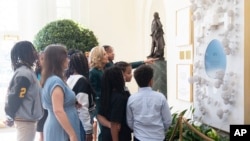Jill Biden unveiled Monday what she says is a reimagined White House public tour that will engage visitors’ senses to teach them about the mansion’s history and events that happened there.
New to the tour is the Diplomatic Reception Room, which previously had been off-limits. This ground-floor room is where President Franklin D. Roosevelt recorded his “fireside chats.” Snippets of some of those conversations will now play for visitors.
Tourists will also be able to go into several other ground-floor rooms that previously were cordoned off at the doorway: the library; the China Room, which houses the collection of presidential place settings; and the Vermeil Room, which houses a collection of gold-plated silver tableware.
There’s also greater access to the East Room and State Dining Room, and the Red, Blue and Green Rooms, all located on the floor above, known as the State Floor.
New displays, or reader rails, provide written details about the rooms, their contents and some of the history that happened there, in addition to offering experiences that encourage visitors to touch, see and hear.
For example, the display in the China Room plays a brief loop of some of the place settings. In the State Dining Room, there’s a replica of a prayer that’s on the mantel beneath a portrait of Abraham Lincoln so people can now read it because they were kept too far away from it.
“As a teacher for 40 years, I know that we all learn in different ways,” the first lady, who teaches English and writing at a community college, said Monday at a White House event to mark the unveiling of the updated tour. People use all of their senses to learn, she said.
“We’ve made replicas so that you can feel the features of some of the sculpture’s faces and touch the shining fabric on the furniture of the Blue Room,” she said. “You can now hear President Roosevelt’s ‘fireside chats’ in the room in which he recorded them, so you can feel as if you are there right beside him.”
“We’ve added screens and information so you can read about what you see in each of the rooms, for you visual learners,” Jill Biden said.
After walking the tour route herself, the first lady decided to expand it and add more educational and historical content, according to aides. It had been decades since the tour was last updated.
“The White House tour now lets visitors touch, hear and see their history up close,” she said Sunday.
Some 10,000 people tour the White House every week.
When they enter through the East Wing, Jill Biden will be there on video to welcome them, while President Joe Biden will be on video in the East Room to talk about some of the history that happened there. The next president, who takes office in January, and his — or her — spouse can record their own greetings since the changes are meant to carry over from one administration to the next.
Collages of printed photos that line the hallway are now digital, making it easier to change them around, while a new vertical 3D model of the 18-acre White House campus explains how the executive mansion was built and expanded over the past 200-plus years.
The first lady’s office has worked on the project for the past two years with the National Park Service, the White House Curator’s office, the private, nonprofit White House Historical Association, presidential libraries and the History Channel, which partnered with ESI Design on the interactive experiences.
The project was funded by a $5 million gift from the History Channel to the National Park Service. The White House is a national park.



